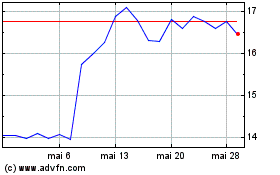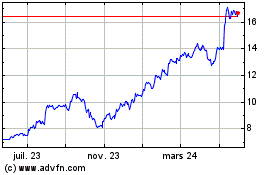By Joseph Walker
Parents are scrambling to find pharmacies carrying EpiPens for
the new school year as regulators and the drug's manufacturer
struggle to abate a continuing global shortage of the lifesaving
devices.
EpiPens, the emergency epinephrine treatment for allergic
reactions, have been in short supply since at least May, when the
U.S. Food and Drug Administration first declared a shortage. Some
pharmacies around the country have been unable to restock the
medication for weeks at a time because of the shortages.
A rival epinephrine injector product, a generic version of
Adrenaclick made by Amneal Pharmaceuticals Inc., is also in short
supply, according to the FDA. That product is manufactured at a
different Pfizer plant in Kansas, where production delays have
caused shortages since the first quarter of the year, an Amneal
spokesman said.
The scarcity is being felt more acutely now amid the
back-to-school rush of August and September when demand for the
devices is highest. For parents of children with food allergies,
refilling EpiPen prescriptions, which are typically for sets of two
in case the first injection doesn't work, has become part of the
annual back-to-school ritual.
Julie Cook has been unable to fill EpiPen prescriptions for her
two teenagers since the beginning of August and is relying on a
single unexpired set if one of them has an allergic reaction. When
she called a Walgreens near her Wheaton, Ill., home a few days ago,
the pharmacist said they may not have more until September.
On the first day of school this week, Ms. Cook split the
unexpired EpiPen set and gave one injector each to her children. As
a backup, she also gave each an old, expired injector from among
the dozen or so she keeps just in case.
"It's so frustrating," Ms. Cook said. "Why is this happening in
August? What's going on? And what's going to happen in the
future?"
EpiPens are sold by Mylan NV and manufactured at a Pfizer
Inc.-owned plant in Brentwood, Mo. Pfizer has been unable to make
enough EpiPens because it is changing its manufacturing processes
in response to an FDA inspection last year that found several
violations, including a failure to investigate serious complaints
about product quality. In a statement, Pfizer said, "We are working
tirelessly to increase production and expedite shipments as rapidly
as possible."
Mylan referred questions about manufacturing delays to Pfizer.
In a statement earlier this month, the company encouraged patients
to call its customer service hotline for assistance in locating
pharmacies with EpiPens in stock.
Rajiv Malik, Mylan's president, said on an earnings call with
analysts earlier this month that "Pfizer supplies to Mylan are
inconsistent and inadequate in meeting global demand." There are
months where supply from Pfizer is good, and "then suddenly we get
very erratic," and supply is 30% to 40% off expectations "because
of the quality issues," Mr. Malik said, according to a
transcript.
To help alleviate the effects of the shortage, the FDA on
Tuesday extended the expiration date for certain EpiPen lots for an
additional four months. The devices typically have a shelf life of
20 months, the agency said. The FDA has also been in touch with
manufacturers of rival products to help ensure alternatives are
available, the agency said.
Kaleo, the privately held maker of the Auvi-Q epinephrine
injectors, has significantly increased manufacturing capacity to
help meet demand in the U.S. and Canada due to the EpiPen shortage,
said Kaleo CEO Spencer Williamson in an interview. Some 40% of all
epinephrine injectors are purchased during the back-to-school
season, he said.
However some patients have said they are reluctant to use Auvi-Q
because it isn't covered under their insurance or because it has a
different mechanism that they and their children aren't used
to.
Patient access to EpiPens has been a controversial issue since
the summer of 2016, when parents looking to buy the devices for
their school-age children complained they had to pay hundreds of
dollars out of pocket to meet insurance deductibles. Congress began
scrutinizing Mylan for raising the list price of EpiPen 548% over
several years to about $608 for a set of two. Mylan later began
selling its own generic version of EpiPen for $300.
Earlier this month, the FDA approved the first generic EpiPen
from a rival, which the agency said was part of an effort to inject
more competition into the pharmaceutical industry and bring down
prices. But Teva Pharmaceutical Industries Ltd., which will market
the generic version in the U.S., said the product would be launched
in "coming months." Antares Pharma Inc., which is manufacturing the
injection device for Teva's generic, said the delay wasn't due to
manufacturing constraints on its part and that it has already
shipped $22 million of product to Teva.
Meanwhile, Mylan issued a nationwide recall last year of certain
EpiPen lots because of a potential manufacturing defect that could
cause the devices to fail to activate. In a letter to Pfizer last
year, the FDA admonished the company for "not thoroughly
investigat[ing]" hundreds of complaints it received, stating that
"EpiPen products failed to operate during life-threatening
emergencies, including some situations in which patients
subsequently died."
Pfizer said in a statement that "there is no information to show
that there was any causal connection between complaints of product
failure and any patient deaths."
Rosvold Pharmacy in Cinnaminson, N.J., hasn't received an EpiPen
shipment since July 19, said owner Thomas E. Stehr. The pharmacy
tries to order more every day, but it is still on back-order, he
said. "We have a pretty good school-age population here," and "the
parents start freaking out" when they can't get EpiPens, Mr. Stehr
said.
Wegmans Food Markets Inc., an East Coast supermarket chain, said
its pharmacies' supply of EpiPens has been spotty since April, and
some of its stores have extremely limited quantities. A significant
share of EpiPen prescriptions are filled between July and
September, according to a Wegmans spokeswoman. To meet demand, the
company will move product between stores or refer patients to
another location, she said.
Tory Palenscar tried in early August to fill EpiPen
prescriptions for her 7-year-old daughter, who suffers from severe
food allergies. Her daughter's school wants her to have four
sets.
But there were no EpiPens at any pharmacy near Ms. Palenscar's
home in Beaumont, Calif. "I started panicking," she said. Finally,
Ms. Palenscar found a pharmacy 30 minutes away in San Bernardino
that agreed to hold one set for her, but she is still waiting to
buy more. She used a voucher from Mylan to cover the prescription's
$170 copay, she said.
She and her husband are keeping the new EpiPen set in an
emergency bag. Ms. Palenscar also obtained two sets of Auvi-Q,
which Kaleo provided to her free of charge because her insurance
policy doesn't cover the product. She has given the Auvi-Q
injectors to her daughter's school, along with two expired EpiPen
sets.
"There's been so many recalls and overcharging. It's one thing
after another, and it feels like we're being taken advantage of and
played with," Ms. Palenscar said. "This is my daughter's life."
Write to Joseph Walker at joseph.walker@wsj.com
(END) Dow Jones Newswires
August 25, 2018 09:14 ET (13:14 GMT)
Copyright (c) 2018 Dow Jones & Company, Inc.
Teva Pharmaceutical Indu... (NYSE:TEVA)
Graphique Historique de l'Action
De Juin 2024 à Juil 2024

Teva Pharmaceutical Indu... (NYSE:TEVA)
Graphique Historique de l'Action
De Juil 2023 à Juil 2024
